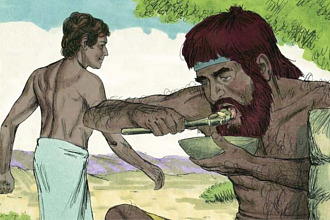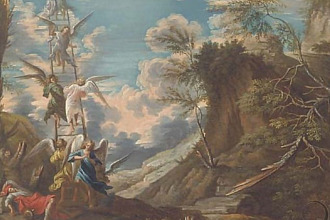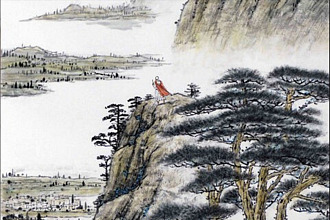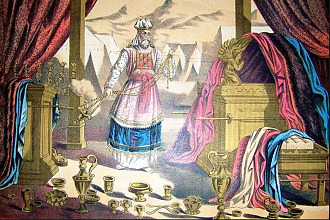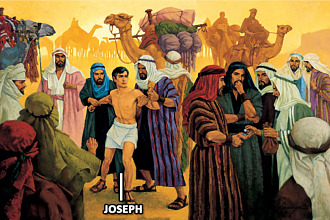Parasha for the Week: Matot/Masei Numbers 30: 2 - 36:13
Aftarah for the Week: Jeremiah 1:1 - 3:4
Besorat Yeshua: Mark 6:14 - 27
Overview Matot:
Moshe teaches the rules and restrictions governing oaths and vows especially the role of a husband or father in either upholding or annulling a vow. The people of Israel wage war against Midian.
They kill the five Midianite kings, all the males and Bilaam. Moshe is upset that women were taken captive. They were catalysts for the immoral behavior of the Jewish People. He rebukes the officers. The spoils of war are counted and apportioned. The commanding officers report to Moshe that there was not one casualty among the children of Israel. They bring an offering that is taken by Moshe and Eleazar and placed in the Ohel Mo’ed (Tent of Meeting).
The Tribes of Gad and Reuven, who own large quantities of livestock, petition Moshe to allow them to remain east of the Jordan and not enter the Land of Israel.
Overview Massei:
The Torah names all 42 encampments of the children of Israel on their forty-year journey from the Exodus until the crossing of the Jordan River into the Land of Canaan. G-d commands the people of Israel to drive out the Canaanites from the Land of Canaan and to demolish every vestige of their idolatry.
The children of Israel are warned that if they fail to rid the land completely of the Canaanites, those who remain will be “pins in their eyes and thorns in their sides.” The boundaries of the Land of Israel are defined, and the tribes are commanded to set aside 48 cities for the levi’im, who do not receive a regular portion in the division of the Land.
Cities of refuge are to be established: Someone who murders unintentionally may flee there.
The daughters of Tzelofchad marry members of their tribe so that their inheritance will stay in their own tribe. Thus ends the Book of Bamidbar/Numbers, the fourth of the Books of the Torah.
“Gad, Reuben, and Manasseh”
The Torah states, “Now the children of Reuben and the children of Gad had a very great multitude of cattle: and when they saw the land of Jazer, and the land of Gilead, that behold, the place was a place for cattle; the children of Gad and the children of Reuben came and spoke to Moses, and to Eleazar the priest, and to the princes of the congregation, saying, Ataroth, and Dibon, and Jazer, and Nimrah, and Heshbon, and Elealeh, and Sebam, and Nebo, and Beon, the land which Yahweh struck before the congregation of Israel, is a land for cattle; and your servants have cattle. They said, If we have found favor in your sight, let this land be given to your servants for a possession; don’t bring us over the Jordan.” (Numbers 32:1-5) Moshe responds to their request with incredulity:
“Moshe said to the children of Gad and the children of Reuven, ‘Shall your brothers go out to battle while you settle here? Why do you dissuade the heart of the Children of Israel from crossing to the Land that God has given them? This is what your fathers did, when I sent them from Kadesh-Barnea to see the Land: They went up to the valley of Eshkol and saw the Land and they dissuaded the heart of the Children of Israel, not to come to the Land that God has given them’.” (Numbers 32:6-9)
Moshe has two objections to this propositions, first he objects to the idea of separation from the main larger community, and secondly he objects because of the consequences of such a separation.
First objection: Separating oneself from his spiritual community is spiritually devastating, the result could be an eternal separation from the community. The first and perhaps prototype for such a separation returns us to the days of Avraham, when his nephew whom he treated as a son also has “flock” problems: “And Avram went up from Egypt, he, and his wife, and all that he had, and Lot with him, to the Negev. And Avram was very rich in cattle, in silver, and in gold. And he went on his journeys from the Negev to Bet-El, to the place where his tent had been at the beginning, between Bet-El and Ha’Ai . . . . And Lot lifted up his eyes, and saw the valley of the Jordan, that it was well watered everywhere, before the Lord destroyed Sodom and Gomorrah, like the garden of the Lord, like the land of Egypt, as you come to Zo’ar. Then Lot chose for himself the valley of the Jordan; and Lot journeyed east, and they separated themselves, one from the other.” (Genesis 13:1-3; 10-11) After some explanations are offered, a deal is brokered whereby these tribes will aid in the conquest of the Land of Israel, and only then return to their inheritance east of the Jordan.”
But there is a curious point. The Torah says, “Moses gave to them, even to the children of Gad, and to the children of Reuben, and to the half-tribe of Manasseh the son of Joseph, the kingdom of Sihon king of the Amorites, and the kingdom of Og king of Bashan, the land, according to the cities of it with their borders, even the cities of the land round about.” (Numbers 32:33). We understand that Moses gave to Gad and Reuben the East bank of the Jordan River, they asked for it, but Why to the half tribe of Manasseh? The text itself is silent; therefore the commentaries feel free to offer different interpretations.
The Ibn Ezra provides a quantitative explanation, theorizing that they did not merit mention until this point because they were so few—even though they were involved in this request from the outset.
Another explanation says that Menasse’s inheritance east of the Jordan was not allotted to them in response to their own request. Moshe initiated the move in an attempt to insure the integrity and continuity of the other two tribes. In Moshe’s mind, all of Israel are, indeed, brothers. Every tribe should feel brotherhood with every other tribe.
“Cities of Refuge”
In this week’s reading, God commands the nation of Israel to set aside Cities of Refuge throughout the land: three in the West bank, and three in the east bank of the Jordan River.
The Lord wanted to give his people another evidence of his care and tender compassion for the unfortunate and the erring.
This merciful provision was rendered necessary by the ancient custom of private vengeance, by which the punishment of the murderer devolved on the nearest relative or the next heir of the deceased. In cases where guilt was clearly evident it was not necessary to wait for a trial by the magistrates. The avenger might pursue the criminal anywhere and put him to death wherever he should be found. The Lord did not see fit to abolish this custom at that time, but He made provision to ensure the safety of those who should take life unintentionally.
The roads to these cities were always to be kept in good repair; all along the way, sign-posts were to be erected bearing the word Refuge in plain, bold characters, that the fleeing one might not hesitate for a moment.
The Talmud tells us that there were two parallel lines of three Cities of Refuge running from north to south, on each side of the Jordan. The three cities on each side were divided such that each was equidistant from the others and also from the borders—dividing the Land of Israel into equal quarters from north to south.
A City of Refuge could only be used by a person who killed another accidentally, but negligently. An alleged murderer would be taken from the city and judged, and returned only if the killing was unintentional. A truly accidental killing, on the other hand, was not punished—a person was liable only if he or she might have taken appropriate precautions and avoided the accident. So the Torah prescribed very different treatment for those who murdered, those guilty of manslaughter, and those who were blameless.
Some of the early commentators, such as the Ramban (Nachmanides), said that murderers would also flee to these cities, in order to make their actions look accidental or under the misconception that they would be safe there. Since it took time to clarify who could stay and who would be removed, more cities were needed where murderers were more common.
In a trial for murder the accused was not to be condemned on the testimony of one witness, even though circumstantial evidence might be strong against him. The Lord’s direction was, “If anyone kills a person, the murderer shall be put to death on the evidence of witnesses. But no person shall be put to death on the testimony of one witness.” (Numbers 35:30).
We cannot imagine that when we live in a world where not only common street criminals but corporate executives engage in thievery, we will not be tempted to “borrow” that which is not ours. And we cannot delude ourselves by thinking that we can expose ourselves to thousands of murders per year on television and in movies, and we will remain every bit as committed to the sanctity of life. We are, indeed, creatures of our environment.
It is our responsibility, then, to build a different environment—to remove poisonous influences from our lives as much as possible, and to surround ourselves with role models, friends and other influences that promote love, life, and holiness.
Haftarah: Jeremiah 1:1 – 3:4
When Moses was called by G-d he was extremely reluctant saying that he was nobody. “Moses said to God, “Who am I, that I should go to Pharaoh…” (Exodus 3:11). When Jeremiah was called he too was reluctant to accept. “Ah, Sovereign LORD,” I said, “I do not know how to speak; I am only a child.” (Jeremiah 1:6)
In our parasha “When a man makes a vow to the LORD or takes an oath to obligate himself by a pledge, he must not break his word but must do everything he said.” (Numbers 30:2)
Jeremiah is a member of a special family. In fact when we read carefully the Bible we discover that Jeremiah was a priest, he was living in Anathoth a city of priests. The Bible states: “The words of Jeremiah son of Hilkiah, one of the priests at Anathoth in the territory of Benjamin.” (Jer 1:1) However, we never see Jeremiah performing his duty in the Temple as a priest. This because Jeremiah is a descendant of a cursed family, he is a descendant of Abiathar who was sent to Anathoth by the king of Israel “To Abiathar the priest the king said, ‘Go back to your fields in Anathoth. You deserve to die, but I will not put you to death now, because you carried the ark of the Sovereign LORD before my father David and shared all my father’s hardships’.” (1Kings 2:26). However Jeremiah is called by G-d to be a prophet in Israel. He knows G-d’s law, he knows that we must not make a promise or a vow and not keep them. And even though Jeremiah was member of a cursed family he finally accepted his calling. It was a great risk for him, not to be heard because he was one of the famous priest of Anathoth.
Another connection between the parasha and the Aftarah is that The people of God are in the desert living a sort of honeymoon with G-d. Jeremiah reminds Israel of the time of their first love in the desert. “Go and proclaim in the hearing of Jerusalem: “‘I remember the devotion of your youth, how as a bride you loved me and followed me through the desert, through a land not sown.” (Jeremiah 2:2) However in the desert Moses reproaches God’s people and their leaders of their unfaithfulness. “Moses was angry…” it is exactly what Jeremiah did in the next chapters of his book..
Apostolic Writings: Colossians 1:18 - 19
Moshe was the head of the Jewish people who left Egypt three thousand and five hundred years ago. But leading Israel he felt the necessity to appoint new leaders under the advice of Jethro his father in law. He appointed leaders of thousands, hundreds, fifty and tens (Deuteronomy 1:15). At the end of Bamidbar (Numbers), Moshe addressed his speech to the heads of the people (Numbers 30:1). However in the Apostolic Writings the concept of leadership changed and Yeshua who built his first kehillah (assembly) with the 12 talmidim was himself the leader or head and was recognized by his movement as the head of the Kehillah.
The great difference between the time of Moshe and Yeshua is that when Moshe died he transmitted his leadership to Joshua, but Yeshua who died for only three days and raised from the dead was confirmed in his position as the head of the kehillah by G-d and in fact is still the head of the kehillah for eternity. That is the privilege of the Messiah who is eternal as Micah prophecies it: “But you, O Bethlehem Ephrathah, who are too little to be among the clans of Judah, from you shall come forth for me one who is to be ruler in Israel, whose coming forth is from of old, from ancient days.” (Micah 5:2), he is the ruler of Israel, who come from the old, from the ancient days, that means from eternity, that is why his name is the holy name of G-d, Jeremiah identified the Messiah to God himself saying “Behold, the days are coming, declares the LORD, when I will raise up for David a righteous Branch, and he shall reign as king and deal wisely, and shall execute justice and righteousness in the land. In his days Judah will be saved, and Israel will dwell securely. And this is the name by which he will be called: ‘The LORD is our righteousness.’” (Jeremiah 23:5–6) And Rabbi Shaul said: “For in him all the fullness of God was pleased to dwell,” (Colossians 1:19).
It is this Yeshua, in which, the fullness of God dwells, who is the true head of the kehillah (Colossians 1:18), which is presented as a living organism, a body, and in which each one of us, as a member of this body has his own function for the good of the whole body. Let’s remember that Yeshua is the head of this body, and he will be forever.
Of course there are still leaders in the kehillah of Yeshua, but they are not called “king,” “prince,” or “rabbi,” as Yeshua said: ““But you are not to be called rabbi, for you have one teacher, and you are all brothers.” (Matthew 23:8). The text affirms “you have one teacher” this teacher is Yeshua, he is the one who teaches his kehillah through the Ruach Hakodesh (Holy Spirit) as Yeshua affirmed it: “But the Helper, the Holy Spirit, whom the Father will send in my name, he will teach you all things and bring to your remembrance all that I have said to you.” (John 14:26)
The leaders of the kehillah are called in the Apostolic Writings, deacons (diakonos, in Greek, which means “servant.” They are also called “pastors” which means “shepherds” they are those who take care of Yeshua’s lambs and who are ready to give their life to save them from wolves.
And the Lord who wants to lead his kehillah gives to her ministries which are listed by Rabbi Shaul: “And he gave the apostles, the prophets, the evangelists, the shepherds and teachers, to equip the saints for the work of ministry, for building up the body of Christ,” (Ephesians 4:11–12). These ministries which can be abbreviated with the acronym APEST were given to the first kehillah, and they have been present during all the history of the kehillah of Yeshua until today. They have been given to equip the kehillah, in order to fulfill the mission of God and for the edification of his spiritual temple, which is the body of Messiah with the ultimate purpose to prepare a people who will be ready for the second coming of the Messiah.
The most important question today is to know if we are preparing ourselves and the world for the coming of Mashiach. For this preparation all the ministries listed as APEST By Rabbi Shaul are necessary at the level of each congregation, that is why if we discover that our community is not growing, we should assess the community in order to discover if all the ministries APEST are present, if one is missing, the mission of the congregation cannot be fulfilled. Thus this congregation needs to meet together in meetings of prayer and fast, as the talmidim of Yeshua did it as an example for us, in Acts 1, and asking in prayer the Lord to pour out the gift of the Holy Spirit on the congregation in order to get all the gifts for the ministry of this congregation. I am sure that we will be amazed to see how God will give to this congregation: Apostles, Prophets, Evangelists, Shepherds and Teachers or APEST.











